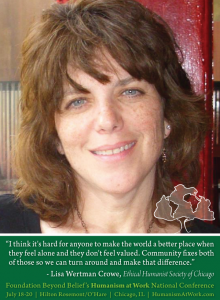“The key to community is showing up”—Lisa Wertman Crowe, Ethical Humanist Society of Chicago
By Administrator To most people in the freethought movement, and to the movement itself, “humanist community” is a new idea. But Lisa Wertman Crowe can’t remember a time when humanism and community didn’t go together.
To most people in the freethought movement, and to the movement itself, “humanist community” is a new idea. But Lisa Wertman Crowe can’t remember a time when humanism and community didn’t go together.
“I joke that I attended a ‘humanist parochial school’ in New York—the Ethical Culture School. I was in the Society for Ethical Culture building six days a week. My family on both sides were Polish Jewish immigrants, and my early years were a little like Woody Allen’s Radio Days—wonderful accents, great food, and constant humor.” The emphasis was decidedly on education, not religion.“I was lucky to have parents who rejected religious dogma for critical thinking and encouraged the same in my sister and me. And it was wonderful to be in a community of others who had similar thoughts and experiences. It made me feel less alone or odd in what seemed like a strange world of believers.”
The Ethical Humanists of her community gave her a sense of belonging and identity. “Like any religious community, we had Sunday programs, ceremonies, celebrations and memorials. Each stage of my life was shared and appreciated by others. It actually taught me tolerance of religious folks because I could see how much a supportive community could enhance people’s lives.”
Making community isn’t magic, but it also doesn’t happen by itself. “The key is showing up and actively making connections with others. Once that happens, you have a community. Most people I meet at the Ethical Humanist Society of Chicago say they were ‘non-joiners’ when they first found us, and were reluctant to join until they started making friends. They’d come to hear the speakers but didn’t feel really connected to the movement or the community until they made friends. It happened to me, too. My husband and I have no family in the Midwest, and when our boys were little, it really helped to have people near us who cared and wanted to help. Now, I feel like I have an extended family, made even better because we share a deep desire to bring out the best in each other and keep the community thriving.
“Once you start making connections and strengthening your group, then you can start to spread roots in the outside community and eventually the world. I think it’s hard for anyone to make the world a better place when they feel alone and they don’t feel valued. Community fixes both of those so we can turn around and make that difference.”
Lisa Wertman Crowe will be a panelist in the secular community presentation at the Humanism at Work conference July 18-20 in Chicago.
